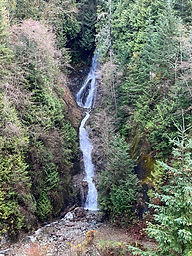Sea to Sky Mosquito Study Underway
- kc dyer

- Jul 20, 2025
- 3 min read
Updated: Jul 21, 2025
Reports of serious illness prompt investigation

Vancouver Coastal Health (VCH) announced this week that they are partnering with the BC Centre for Disease Control, the Líl̓wat and Squamish Nations and the University of BC to undertake a study of the local mosquito population and the viruses they carry in the Sea to Sky region.
The project has been initiated in response to four reported cases of mosquito-borne illness in 2024.
In each case, patients were diagnosed with encephalitis — the swelling of the brain.
The viruses were identified as Snowshoe Hare Virus (SSHV) and Jamestown Canyon Virus (JCV), which are both forms of California Serogroup (CSG) viruses, linked to encephalitis. All four patients were determined to have likely acquired the infections within the Sea to Sky corridor. They are all reported to have recovered from their illnesses.
The new program involves setting up mosquito traps throughout the region, with a plan to both update the list of mosquito species in the area and test the mosquitoes for potential human pathogens.
The goal is to gather data that helps further assess risk and inform Public Health advice on precautions against mosquito-borne illness in the Sea to Sky area.
Medical officials are advising residents and visitors to take precautions.
“While we encourage outdoor recreation and activity, we’re advising residents and travellers to the Sea to Sky area to take preventative measures against mosquito bites, between now and fall," says Dr. Moliehi Khaketla, VCH Medical Health Officer.
She says that if you do get bitten, seek health care advice if you develop neurological symptoms like confusion, seizures or severe headaches with fever.
VCH says they have made local doctors and hospitals aware of the need to consider these viruses as a possible cause for patients with severe neurological symptoms during mosquito season.
“We’re also undertaking the mosquito surveillance project to learn more about the risk to the public,” said Dr. Khaketla.
JCV and SSHV have been found in BC and across Canada for many years, but VCH says reported cases of human illness have been rare. While mosquito season typically runs from May to October, there is concern that the season may be extended due to the increasingly warmer temperatures associated with climate change.
Prior to the cluster of cases in 2024, ten cases of these viruses have been reported in BC since 2009, with two in the Vancouver Health District region.
In most cases, CSG viruses do not cause symptoms, and testing from other parts of Canada shows that up to 42 percent of the population show evidence of a prior infection. This suggests "these viruses may be a cause of mild summer viral illness and an under-recognized cause of meningitis and encephalitis."
If symptoms do occur, (5-15 days after a bite), they are typically flu-like including fever, headache, fatigue, and occasionally nausea or vomiting, and rarely need treatment.
In more serious or persistent cases, symptoms of meningitis or encephalitis may include confusion, seizures, and/or severe headaches with fever.
There is currently no human vaccine available to prevent acquiring CSG viruses.
Protecting your loved ones
In a case of 'better safe than sorry', VCH recommends residents and visitors to the Sea-to-Sky region take the following actions:
Use mosquito repellent – Applying mosquito repellent to areas of exposed skin is an excellent way to prevent mosquito bites. Check the product label for instructions on proper use. For more information about insect repellents, see HealthLinkBC File #96 Insect repellents and DEET.
Wear protective clothing – Avoid dark clothing as it tends to attract mosquitoes. In areas with a lot of mosquitoes, wear full-length pants and a long-sleeved shirt.
Install mosquito screens on windows – Consider staying indoors or in enclosed areas with screens when mosquitoes are most active or abundant, typically from dusk to dawn.
Prevent mosquitoes from breeding – Anything that can hold stagnant water can be a mosquito breeding site. During mosquito season, keep an eye out for stagnant water under flowerpots or in birdbaths, unclog rain gutters, maintain backyard pools and drain tarps, tires and other debris where rainwater may collect. Ornamental ponds can be kept in motion by installing a fountain or stocking them with fish.
More information can be found at the Vancouver Coastal Health region website HERE.
Edited to add: As an alternative to using DEET, reader Ann Marie McKenzie suggests using a bug zapper, and growing plants that are natural deterrents around your yard - citronella, lemon balm, cat nip, lavender and rosemary.
The Watershed values your opinion.
Leave a comment below,
or email editor@lionsbaywatershed.ca
Like what you're reading?
For as little as $5/month, you can support local independent journalism
by subscribing to The Watershed HERE.





Comments